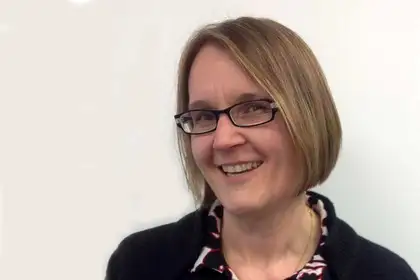
Master of Analytics graduate Michelle Bidwell.
Michelle Bidwell has always loved studying numbers – the former mathematics teacher has a Bachelor of Computer and Mathematical Sciences, a Graduate Diploma in Applied Statistics and, more recently, a Master of Analytics.
She says she decided to tackle her master’s at Massey because of its focus on learning practical business skills.
“While I have a background in maths and a reasonable amount of stats from my postgrad diploma, I really wanted to get more depth across a variety of analytical techniques and tools with a real business focus,” she says.
“I liked that the degree had quite a practical component to it. There was a good mix of theory and practice and it really helped having lecturers that had ‘been there and done that’ to share their stories of what works and what doesn’t.”
As a senior analyst at insurance company Farmers Mutual Group (FMG), Michelle uses the analytics skills she learned at university every day – whether it’s developing reports, generating insights or building predictive models for churn.
“The Master of Analytics has been incredibly useful – I’ve even been able to use my multi-variate research project for a project at work,” she says. “We are now looking at ways to develop it further so that it can be operationalised.
“I’ve also found the degree has given me more confidence, which helps a great deal with presenting findings, or even getting people on board at the start of new project.”
From university to the workplace
Massey’s Master of Analytics is sponsored by business analytics software provider SAS, providing students with access to the globally-recognised SAS joint certificate programme. While SAS business insights ensure lecturers are up-to-date with industry developments, the certificate programme also means graduates hit the ground running.
As FMG uses SAS software, Michelle found transferring her knowledge from an academic environment to the workplace relatively straightforward.
She says the block course structure also provided the flexibility required when juggling study and work, without sacrificing the social aspects of being on campus.
“I needed a course that wasn’t weekly lectures. It can be very difficult getting to lectures during the day while working, so the block courses worked well,” she says.
“They also result in good comradeship and support – I still keep in contact with people from the course. It’s incredibly valuable as it gives you a kickstart with your professional network.”
Communication is still key
Michelle says the key thing she learned from her master’s degree was to be led by the needs of the business. “Talk to the business – no analyst is an island. It is imperative to involve the business right through the process so you understand what data or variables to bring into the analysis, if what you’re seeing makes sense and if the final findings ring true.”
She says that while good maths skills are a given, communication is just as key to being a good data analyst.
“You need to be able to communicate what you are doing, why you are doing it, what you are seeing in the data, why it’s important and what to do with it – all to a wide range of people.
“There’s no point to having the perfect model if people do not understand why they need it – and they are less likely to use it if they don’t understand it.”
In the short-term Michelle is consolidating her skills and embedding more advanced predictive models in her role at FMG. Her longer-term ambitions include becoming a principal analyst and getting involved in analytical strategy, as well as calling on her teaching background to mentor younger analysts.